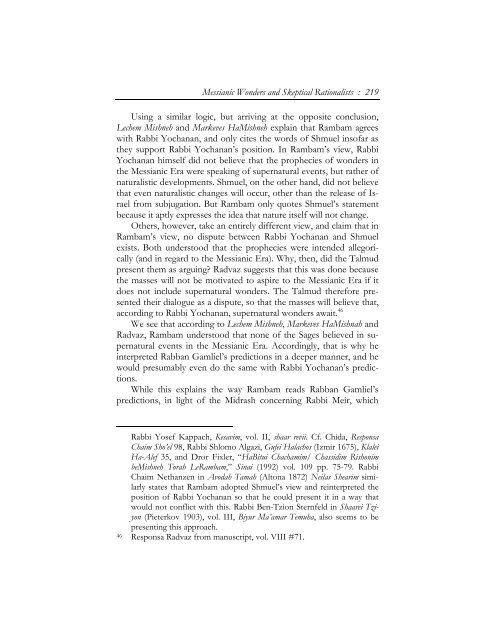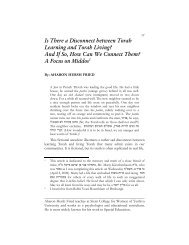Messianic Wonders and Skeptical Rationalists - Hakirah.org
Messianic Wonders and Skeptical Rationalists - Hakirah.org
Messianic Wonders and Skeptical Rationalists - Hakirah.org
Create successful ePaper yourself
Turn your PDF publications into a flip-book with our unique Google optimized e-Paper software.
<strong>Messianic</strong> <strong>Wonders</strong> <strong>and</strong> <strong>Skeptical</strong> <strong>Rationalists</strong> : 219<br />
Using a similar logic, but arriving at the opposite conclusion,<br />
Lechem Mishneh <strong>and</strong> Markeves HaMishneh explain that Rambam agrees<br />
with Rabbi Yochanan, <strong>and</strong> only cites the words of Shmuel insofar as<br />
they support Rabbi Yochanan’s position. In Rambam’s view, Rabbi<br />
Yochanan himself did not believe that the prophecies of wonders in<br />
the <strong>Messianic</strong> Era were speaking of supernatural events, but rather of<br />
naturalistic developments. Shmuel, on the other h<strong>and</strong>, did not believe<br />
that even naturalistic changes will occur, other than the release of Israel<br />
from subjugation. But Rambam only quotes Shmuel’s statement<br />
because it aptly expresses the idea that nature itself will not change.<br />
Others, however, take an entirely different view, <strong>and</strong> claim that in<br />
Rambam’s view, no dispute between Rabbi Yochanan <strong>and</strong> Shmuel<br />
exists. Both understood that the prophecies were intended allegorically<br />
(<strong>and</strong> in regard to the <strong>Messianic</strong> Era). Why, then, did the Talmud<br />
present them as arguing? Radvaz suggests that this was done because<br />
the masses will not be motivated to aspire to the <strong>Messianic</strong> Era if it<br />
does not include supernatural wonders. The Talmud therefore presented<br />
their dialogue as a dispute, so that the masses will believe that,<br />
according to Rabbi Yochanan, supernatural wonders await. 46<br />
We see that according to Lechem Mishneh, Markeves HaMishnah <strong>and</strong><br />
Radvaz, Rambam understood that none of the Sages believed in supernatural<br />
events in the <strong>Messianic</strong> Era. Accordingly, that is why he<br />
interpreted Rabban Gamliel’s predictions in a deeper manner, <strong>and</strong> he<br />
would presumably even do the same with Rabbi Yochanan’s predictions.<br />
While this explains the way Rambam reads Rabban Gamliel’s<br />
predictions, in light of the Midrash concerning Rabbi Meir, which<br />
Rabbi Yosef Kappach, Kesavim, vol. II, shaar revii. Cf. Chida, Responsa<br />
Chaim Sho’el 98, Rabbi Shlomo Algazi, Gufei Halachos (Izmir 1675), Klalei<br />
Ha-Alef 35, <strong>and</strong> Dror Fixler, “HaBitui Chachamim/ Chassidim Rishonim<br />
beMishneh Torah LeRambam,” Sinai (1992) vol. 109 pp. 75-79. Rabbi<br />
Chaim Nethanzen in Avodah Tamah (Altona 1872) Neilas Shearim similarly<br />
states that Rambam adopted Shmuel’s view <strong>and</strong> reinterpreted the<br />
position of Rabbi Yochanan so that he could present it in a way that<br />
would not conflict with this. Rabbi Ben-Tzion Sternfeld in Shaarei Tziyon<br />
(Pieterkov 1903), vol. III, Biyur Ma’amar Temuha, also seems to be<br />
presenting this approach.<br />
46 Responsa Radvaz from manuscript, vol. VIII #71.
















